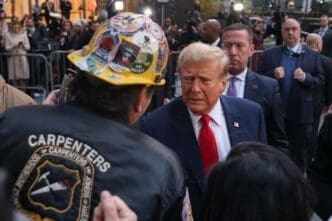Working-class and union voters, traditionally aligned with the Democratic Party, are increasingly supporting the Republican Party as evidenced by recent election gains and a notable cabinet appointment by President-elect Donald Trump.
A significant political shift is underway as working-class voters, including those from union households, increasingly support the Republican Party, a change highlighted by President-elect Donald Trump’s latest cabinet pick. Trump has appointed a GOP congresswoman with union support to be his labor secretary, signaling a growing trend of union members gravitating towards Republicans.
Oregon Representative Lori Chavez-DeRemer, a Republican, received robust backing from union members in her recent election campaign, despite losing her bid for a second term. This support reflects a broader movement among union voters, traditionally a Democratic stronghold, towards the Republican Party, which has historically aligned with business interests.
Trump’s populist appeal has resonated with a portion of the union rank-and-file, even as major unions like the AFL-CIO and UAW endorsed Democrat Kamala Harris in the presidential race. Trump’s engagement with the International Brotherhood of Teamsters, where he emerged with claims of backing from union members, underscores this trend. Yet, the Teamsters abstained from endorsing either Trump or Harris.
Chavez-DeRemer, despite her loss, maintains significant influence, having been one of the few House Republicans to support the ‘Protecting the Right to Organize’ (PRO) Act. This legislation, favored by labor, aims to bolster organizing efforts and penalize companies that violate workers’ rights. Her backing of such measures indicates a pragmatic approach to labor issues.
However, Trump’s administration’s agenda poses challenges. His first term was marked by pro-business stances, including appointments to the National Labor Relations Board that often conflicted with union interests. Though some policies expanded worker protections, they fell short of union expectations and were often contested by Democratic counterparts.
Labor Department policies impact wages, health and safety standards, unionization rights, and employers’ rights to dismiss employees. Trump’s stronger performance among non-college-educated voters has contributed to his significant gains in states with substantial union populations, such as Pennsylvania, Michigan, and Wisconsin.
Union leaders express cautious optimism regarding Chavez-DeRemer’s potential role, acknowledging her record on workers’ rights while remaining wary of the broader Trump administration’s anti-union policies. Becky Pringle, president of the National Education Association, emphasized the importance of Chavez-DeRemer’s commitment to supporting both workers and students over adherence to the Trump administration’s agenda.
Similarly, AFL-CIO President Liz Shuler welcomed Chavez-DeRemer’s nomination but noted skepticism about the administration’s true intentions towards labor. The confirmation process will be closely scrutinized by labor organizations to ensure that worker protections remain a priority.
As the political landscape shifts, union members are becoming a crucial part of the Republican coalition, driven partly by Trump’s appeal and recent strategic appointments. However, the extent to which this trend will continue hinges on the administration’s balancing act between pro-business policies and labor rights advocacy.
Source: News4jax








